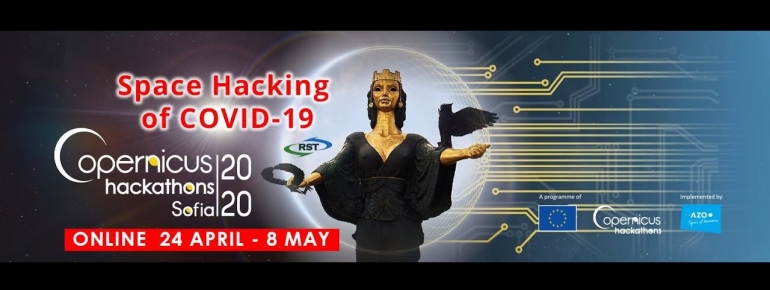The Copernicus Hackathon Sofia 2020

The COVID-19 pandemic has put humanity before an unprecedented test, proving once again the importance of research and new technology in crisis situations. Due to these unusual circumstances, the Copernicus Hackathon Sofia 2020, organised by the Risk-Space Transfer Office (RST-TTO), Eurisy’s member, has become a virtual one. Participants have the opportunity to get acquainted with the latest technologies for Earth observation and to find innovative space applications. With the knowledge and skills of specialists in core fields such as information technologies, physics, mathematics, and earth sciences, the hackathon aims to overcome the effects of the COVID-19 crisis through new ideas, focused on the main services of the Copernicus programme.
After the opening session on the 24th of April, participants started teaming up. The next day, the Copernicus programme was introduced to the participants with a presentation followed by a workshop and technical mentorship. The teams worked remotely on their projects during the next couple of days. For this week, the particpants are free to join a daily webinar. On Tuesday 28 April, Weronika Borejko from EARSC presented Project PARSEC-H2020, and a Eurisy presentation on the topic of smart cities is planned for today. Starting from next week, on Monday 4th of May, the teams will be reviewed by their mentors. On Friday 8th of May, during the last day of the hackathon, the teams will present their results and the jury will select the winners.
Eurisy Secretary-General, Jean-Jacques Tortora, will be part of the jury evaluating the participating teams. On April 24, during the event kick-off, Jean-Jacques Tortora was invited to give an opening speech. If you missed the opening remarks by the organisers and official guests, you can watch all the introductory remarks below.
I would like to congratulate the organisers, not only for having proven to be so flexible in coming up with this new organisation online, but also for having a renewed focus on the challenges posed by the coronavirus, which is a historical challenge posed to all societies around the world and definitely Copernicus has a role to play in our response to this crisis.
Jean-Jacques Tortora emphasised the wide range of opportunities offered by space data and concluded:
Copernicus is a source of vast social economic benefits. One of the key factors to that is the free and open data policy which enables and encourages private actors and start-ups to create innovative services and applications. It is quite clear that global challenges require global solutions. This is what space is good at, and to some extent, something that only space can do. Pandemic crises is one of them, but next to that we also have climate change and the Green Deal, as well as the digital agenda. Copernicus contributes to the modernisation of the public sector, delivering more efficient public services. I look forward to a successful, fruitful and constructive hackathon despite the difficult circumstances. I would like to really congratulate and encourage all the teams to come up with fresh and innovative ideas and I look forward to further discuss them with all of you.
Eurisy will continue to support the hackathon with a webinar on the topic of smart cities. The webinar, scheduled on 29 April between 15:30 and 16:00 (CET), will be freely available via livestream.
For the full programme see: https://hackathon.rst-tto.com/programme/en.
